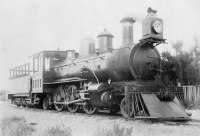Hautere Cross Railway Station's Cross
'Hautere' is a Māori word but despite their Christianisation, there is nothing to suggest that Hautere Cross had any religion associated with its railway station.
So why is there a 'Cross' in its name?
Hautere Cross Railway Station
'Hautere' is the Māori word for 'flying wind'.
This station was born way back in the Pioneering Days of the late-19th early-20th century. And it was also then that its history stopped. Nothing of the station or its yard can be seen today in this sparsely populated rural area.
About 70 km north of Wellington, on the North Island of New Zealand, Hautere Cross was a settlement on the juncture of Totaranui Road and Hautere Cross Road (map); the latter being a road crossing from Te Horo on the west coast towards Otaki River in the east.
Yes, you've guessed: That crossing is the reason for the word 'Cross'.
In 1886, not long after the Land Wars, the Wellington & Manawatu Railway line through Hautere Cross was completed to help populate the area with British settlers. The railway company bought land from the Māori in the form of company shares and the allocation was reported to have been generous.
The station would have been used by farmers to move their produce to the main line on the west coast and to bring in supplies. The Hautere Cross name was simply adopted from the name of the settlement and its 'Cross' just meant the route crossed from Te Horo to the river.
¶ Other railway stations with 'Cross' in the name
New Zealand's capital city of Wellington was named after Arthur Wellesley, the first Duke of Wellington and victor of the Battle of Waterloo. (See Old Sam's Christmas Pudding)
Te Horo is Māori for 'landslide')
Land Wars between Māori tribes and the white settlers (who were backed by the Crown) 1845-1872 - see newzealandwars.co.nz
